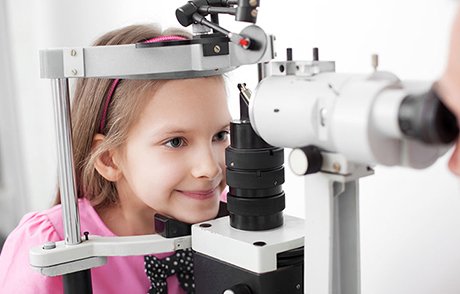

As your trusted eye doctor in and around NYC, Manhattan, and the Upper West Side, the practice of Dr. Edwin M. Schottenstein is proud to offer comprehensive eye care, including treatments such as cataract surgery, LipiFlow, and diabetic retinopathy. It’s Dr. Schottenstein’s goal to provide you with more than just effective treatments though – he wants to give you the information necessary for you to make the best decisions regarding your visual health. That’s why we’re glad to give you a list of answers to some of the most frequently asked questions about ophthalmology.
Think of an eye like a camera. When you take a picture, the lens in front of the camera will allow light to pass through it and focus on the film that covers the back of the camera. A picture is then taken when the light hits that film. For vision, the front of the eye is clear, which allows light to pass through. The cornea and the lens of the eye will focus the light on the eye’s back wall, which is the retina. The retina is essentially the film; it will send messages through the optic nerve and to the brain, allowing a person to see.
A person is legally blind when their better eye’s best corrected visual acuity is less than 20/200 – well below perfect vision at 20/20. A person can also be classified as legally blind if his or her side vision in the better eye is narrowed to 20 degrees or less. Although a person may be legally blind, some vision may still be available and useful in everyday life. Legally blind people are able to qualify for some government benefits.
Low vision is classified as a level of vision below normal (20/70) that can’t be corrected with conventional glasses. This can interfere with a person’s daily activities, including reading and driving.
Ophthalmologists provide comprehensive eye care that includes medical, surgical, and optical care. Ophthalmologists require four years of premedical college, four years of medical school, one year of internship, and three years of medical and surgical training in eye care.
Optometrists will go to an accredited optometry college for four years, but they don’t have to attend medical school. Optometrists can diagnose eye conditions, but they’re usually not licensed to perform any surgical eye treatments.
While an optometrist is licensed to provide primary eye care services, an ophthalmologist will complete special training in all areas of eye care, including prevention, diagnosis, and medical and surgical treatment of eye conditions and diseases.
The American Academy of Ophthalmology and the American Academy of Pediatrics both recommend that the first vision screening should be conducted for a newborn prior to being discharged from the hospital. Visual function will then continue to be monitored by your child’s pediatrician at well-child exams (usually at two, four, and six months of age). If there are any signs of an eye condition, your child may be referred to an eye doctor. At the age of three, regular screenings should then take place.
Poor vision can be directly related to your family’s history of eye health. You should visit your eye doctor when you first notice that you may have poor vision.
Poor vision can be directly related to your family’s history of eye health. You should visit your eye doctor when you first notice that you may have poor vision.
No. There’s no evidence that this will hurt anyone’s eyes.
There’s no evidence that working at a computer screen can damage your eyes. However, staring at a screen for too long can cause the eyes to become fatigued, which is why it’s recommended to take occasional breaks so that your eyes can rest.
No. Dim light won’t hurt your eyes.
Pink eye commonly refers to a viral conjunctivitis, which is very contagious. Because many conditions that result in pink eye can be threatening to a person’s vision, it’s vital to have a proper diagnosis.
Presently, there’s no medical way to transplant a whole eye. However, a cornea transplant is possible.
By wearing UV protective lenses, you can protect your eyes from cataract formation. Surprisingly though, clear UV-coated lenses may actually offer more protection than darker lenses because they let the eyes be exposed to more light, causing the pupil to constrict more and prevent light from entering the eye.
New technological advancements allow for many new materials that can make glasses virtually indestructible. Titanium frames and polycarbonate lenses are two of the newest and strongest materials used. Polycarbonate materials, glass, and various types of lightweight plastics are available to make the lenses.
While eye exams will vary depending on a patient’s needs, they have a few things in common. These include the following tasks:
Eating carrots will give you a small amount of vitamin A, which is good for your vision. Vitamin A can also be found in milk, cheese, egg yolk, and broccoli.
If you injure your eye, you should seek immediate medical assistance from your eye doctor or go to an emergency room. This will help reduce the risk of any permanent damage.
If you’re looking for an ophthalmologist in and around NYC, please don’t hesitate to give us a call at (212) 874-2300. Alternatively, you can fill out our online appointment request form. We’re looking forward to hearing from you!